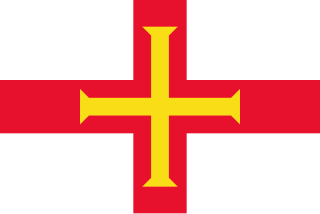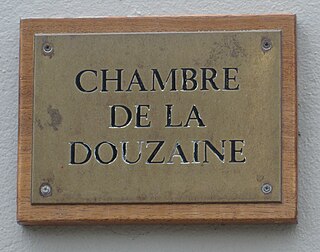
The Channel Islands are an archipelago in the English Channel, off the French coast of Normandy. They are divided into two Crown Dependencies: the Bailiwick of Jersey, which is the largest of the islands; and the Bailiwick of Guernsey, consisting of Guernsey, Alderney, Sark, Herm and some smaller islands. Historically, they are the remnants of the Duchy of Normandy. Although they are not part of the United Kingdom, the UK is currently responsible for the defence and international relations of the islands. The Crown Dependencies are neither members of the Commonwealth of Nations, nor part of the European Union. They have a total population of about 171,916, and the bailiwicks' capitals, Saint Helier and Saint Peter Port, have populations of 33,500 and 18,207 respectively.

Guernsey is the second largest island in the Channel Islands, located 27 miles (43 km) west of the Cotentin Peninsula, Normandy. It forms the major part of the jurisdiction of the same name, which also comprises three other inhabited islands and many small islets and rocks. The jurisdiction has a population of 63,950 and the island has a land area of 24 square miles (62 km2).

Politics of Guernsey take place in a framework of a parliamentary representative democratic British Crown dependency.

Sark is a part of the Channel Islands in the southwestern English Channel, off the coast of Normandy, France. It is a royal fief, which forms part of the Bailiwick of Guernsey, with its own set of laws based on Norman law and its own parliament. It has a population of about 500. Sark has an area of 2.10 square miles (5.44 km2). Little Sark is a peninsula joined by a natural but high and very narrow isthmus to the rest of Sark Island.

Alderney is the northernmost of the inhabited Channel Islands. It is part of the Bailiwick of Guernsey, a British Crown dependency. It is 3 miles (5 km) long and 1+1⁄2 miles (2.4 km) wide.

The Crown Dependencies are three offshore island territories in the British Islands that are self-governing possessions of the British Crown: the Bailiwick of Guernsey and the Bailiwick of Jersey, both located in the English Channel and together known as the Channel Islands, and the Isle of Man in the Irish Sea between Great Britain and Ireland. They are not parts of the United Kingdom (UK) nor are they British Overseas Territories. They have the status of "territories for which the United Kingdom is responsible", rather than sovereign states. As a result, they are not member states of the Commonwealth of Nations. However, they do have relationships with the Commonwealth and other international organizations, and are members of the British–Irish Council. They have their own teams in the Commonwealth Games.
The Bailiff is the chief justice in each of the Channel Island bailiwicks of Guernsey and Jersey, also serving as president of the legislature and having ceremonial and executive functions. Each bailiwick has possessed its own bailiff since the islands were divided into two jurisdictions in the 13th century. The bailiffs and deputy bailiffs are appointed by the Crown on the advice of the Secretary of State for Justice and may hold office until retirement age.

The Bailiwick of Guernsey is a self-governing British Crown Dependency off the coast of Normandy, France, comprising several of the Channel Islands. It has a total land area of 78 square kilometres (30 sq mi) and an estimated total population of 67,334.

Guernsey elects a legislature at the national level. The islands of Alderney and Sark also elect their own parliaments.
The jurats are lay people in Guernsey and Jersey who act as judges of fact rather than law, though they preside over land conveyances and liquor licensing. In Alderney, however, the jurats are judges of both fact and law in both civil and criminal matters.

The States of Guernsey, officially the States of Deliberation and sometimes referred to as the Government of Guernsey, is the parliament and government of the British Crown dependency of Guernsey. Some laws and ordinances approved by the States of Guernsey also apply to Alderney and Sark as "Bailiwick-wide legislation" with the consent of the governments of those islands. All enactments of the States of Guernsey apply to Herm as well as Guernsey, since Herm is directly administered by the Bailiwick of Guernsey.

The lieutenant governor of Guernsey is the representative of the British monarch in the Bailiwick of Guernsey, a Crown dependency of the British Crown. The role of the lieutenant governor is to act as the de facto head of state in Guernsey and as liaison between the governments of Guernsey and the United Kingdom. The holder of this office is also ex officio a member of the States of Guernsey but may not vote and, by convention, speaks in the Chamber only on appointment and on departure from post. The duties are primarily diplomatic and ceremonial. He has the authority to appointment two members of the board of governors of Elizabeth College and the Priaulx Library.

The States of Alderney is the parliament/council and the legislature of Alderney, part of the Bailiwick of Guernsey. The origin of the States is unknown, but has operated from the medieval period. The States of Alderney comprises ten Members, and a President of the States of Alderney, currently William Tate who was elected in 2019 and re-elected in 2020.

The Bailiwick of Guernsey includes the island of Guernsey and other islands such as Alderney, Sark, Herm, Jethou, Brecqhou, and Lihou. Each parish was established, probably in the 11th century, as a religious area, each having its parish church. Administratively each parish is now administered by an elected council known as a Douzaine.

The Leader of Alderney is the civil leader of Alderney. Alderney is a dependency of the Bailiwick of Guernsey. Its leader has traditionally been appointed by the British Crown and has been known by various titles including Lord of Alderney, Governor of Alderney, and the current President of the States of Alderney. The President of the States of Alderney is directly elected every four years and there is no constitutional limit to the number of terms served. The current president, William Tate has held the post since 2019.

The President of the States of Alderney, also known as the President of Alderney, is the elected head of Alderney's legislature, the States of Alderney and the Leader of Alderney. The Presidency is the latest of a variety of political positions to govern the island. The office was established in 1949 after a new constitution establishing Alderney as a subordinate part of the Bailiwick of Guernsey.
The Judge of Alderney is the senior judicial officer in Alderney, ranking above the six Jurats. The holder was until 1949 entitled to a seat in the States of Alderney, and between 1825 and 1949 was Leader of Alderney.

The Bailiwick of Guernsey is a British Crown dependency in the English Channel off the coast of Normandy. As a bailiwick, Guernsey embraces not only all ten parishes on the island of Guernsey, but also the islands of Alderney and Sark – each with their own parliament – and the smaller islands of Herm, Jethou and Lihou. Although its defence is the responsibility of the United Kingdom, the Bailiwick is not part of the United Kingdom, but, as its description suggests, a possession of the Crown. Consequently, though it lies within the Common Travel Area, it was never part of the European Union.

The Courts of Guernsey are responsible for the administration of justice in the Bailiwick of Guernsey, one of the Channel Islands. They apply the law of the Island, which is a mixture of customary law dating back as far as the 10th century and legislation passed by the legislature, the States of Deliberation.

The Law of Guernsey originates in Norman customary law, overlaid with principles taken from English common law and French law, as well as from statute law enacted by the competent legislature(s) – usually, but not always, the States of Guernsey.











